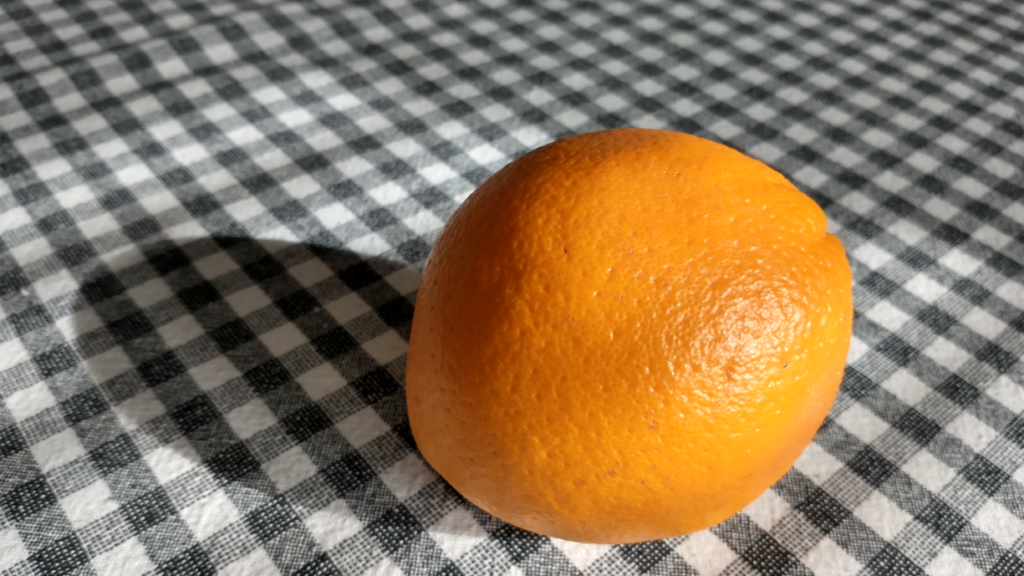Yesterday, I had an orange.
Buying oranges – or any citrus – in Canada is always a bit of a roulette. And I am not much of a gambler. But sometimes the craving for a sweet, tangy piece of the subtropics convinces one that it is worth the risk of intense disappointment. After coming so far and in cold storage, it is no wonder that oranges often lose their rich, plump goodness. But it is a treasure hidden behind a rind, and try as I might, I have never managed to discover the secret of determining what sort of orangey soul hides within. Is it sweet, plump, juicy? Bringing into your mouth some remembrance, a greeting from warmer climes? Or is it stringy, dry and hard, reminding you that whether you like it or not, oranges just don’t grow in Canada.
But the orange I had yesterday was magnificent – a paragon of orangehood. And it caused me to reflect – not in the moment, of course; the moment was filled only with the unutterable delight of partaking of this ambrosiac produce. But later, as the sweet memory lingered in my mind and on my taste buds, I thought: How lucky I am to live in an age when I can eat oranges in Canada and not consider it a luxury! And in the winter no less!
True, one must consider the environmental implications of a system which keeps a northern country constantly supplied with fresh citrus. I admit my mind struggles to comprehend it, and my conscience shrinks from it.
But I propose we leave moral complexity aside for one brief moment to contemplate how blessed we are in this modern age.
As long as I have money in the bank, I will not go hungry. There is always food to be had – good, nutritious food. And even if prices have been rising (they always seem to be rising), it is still affordable. But there have been times and places when no matter how much money you had, there was no food to be bought. There were famines. There were also leaner times of year, which needed to be accounted for in the housekeeping, in the storing, preserving and rationing of food that could not be replenished until the next harvest. Because in the meantime, people cannot live on air.
And so, though I am dubious about the trade-off in terms of environmental cost, I am exceedingly, from-the-bottom-of-my-heart grateful that I can eat an orange, at very little effort or expense, in Canada in the winter.
But what happens when we cease to view these immense blessings and privileges through the lens of gratitude? Can there be, at a personal level, a downside to the accessibility of oranges in Canada?
There is a sense in which having too much can be a burden. It robs you of the joy of having something special. Because what might have been special becomes everyday and ordinary.
You have cake on your birthday. But if you eat cake every day, how have you made this day special? You go out for a nice meal on your anniversary. But if you go out for a nice meal even once a week, how have you made this day special? Maybe you get a more expensive cake or go to a more upscale restaurant, but can you really feel the difference?
I contend that the difference between nothing and something will always be greater than the difference between something and something better.
And somehow, we cannot manufacture that lack. We can to a certain extent, but somehow it is not the same as a genuine lack. I can choose not to eat cake on a regular basis. Then when I do have cake, it will indeed feel like a special treat. But somehow, because I know that I could have cake, the joy is never so great as when the lack is not something of my own choosing. Funny how the mind works.
In the last few centuries – at the very least since the Industrial Revolution – we have been striving toward a type of progress which makes the world smaller and takes mundane tasks out of the hands of men and women. We will be much happier if we are free of the drudgery of daily life, if we can have more things and more food faster and cheaper. Everything in abundance. And I do not deny that this is good. Of course it is good that people who would have starved in the past, or at the very least have been malnourished, have easy access to abundant food. Of course I consider it good (whether it be or not!) that I can sit and write this reflection while a machine gently agitates my clothes and another fluffs them dry, saving me from sore muscles and chapped hands.
But there is a trade-off. There is always a trade-off. Living in an age and a place of abundance, we have reduced our access to joy, the profound joy that comes from simple pleasures.
Is it worth it? And do we have a choice?
